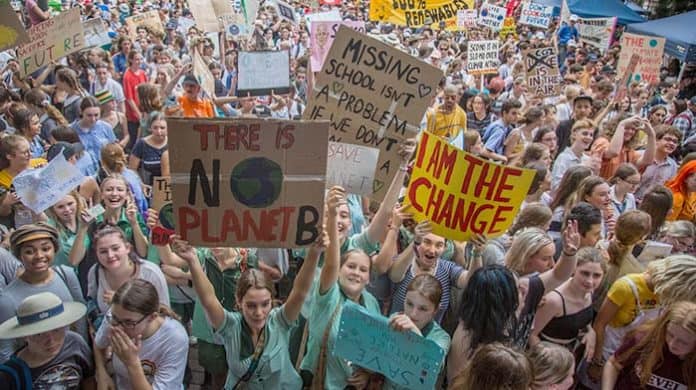The climate crisis is rapidly accelerating. July was the hottest month since records began. Unprecedented fires rage across the Arctic, with a cloud of smoke bigger than the European Union covering Siberia as this article was written. The Greenland ice sheet is melting faster than ever, losing 12.5 billion tons of ice in a single day.
A newly released IPCC report details the enormous pressure that corporate livestock production, agriculture and forestry are placing on the climate system and the capacity of land to produce food. Half a billion people already live in places turning into desert, soil is being lost between ten and 100 times faster than it is forming and the potential for large-scale crop failures is increasing.
As the UN Special Rapporteur on human rights Philip Alston said, many people will have to choose between starvation and migration: “We risk a ‘climate apartheid’ scenario where the wealthy pay to escape overheating, hunger, and conflict while the rest of the world is left to suffer.”
Leading scientists now say that the IPCC’s 2018 report on avoiding a temperature rise of more than 1.5 degrees underestimated how quickly the world is heating. Antarctic ice is being lost far more rapidly than predicted and the rate of thawing of permafrost in the Arctic, which releases potent greenhouse gases, is also shocking scientists.
Morrison—climate criminal
Meanwhile, the Morrison government continues its climate denial. Going into the Pacific Islands Forum in August, Morrison rebadged existing aid commitments as a “climate” fund, to help develop renewable energy and mitigation infrastructure as sea level rises on the islands force displacement. But Australia is rejecting Pacific calls to take responsibility for its own emissions and suppressed any references in a conference declaration to a transition away from coal or a binding 1.5 degree target.
Huge expansions of fossil fuel extraction are planned across Australia. Adani has begun to clear land on the proposed site of the Carmichael mine and fracking is expected at two sites in the NT any time now, the start of a planned fracking onslaught across the Territory. The Coalition also wants new coal and gas fired power stations. They are even considering public subsidies to keep AGL’s aging Liddell coal-fired power station open.
Strike back
The accelerating crisis is leading to a new wave of climate activism.
On 20 September, school students are calling for workers to join them in a Global Climate Strike. In Australia, the School Strike for Climate (SS4C) organising group have shifted decisively since the disastrous federal election, to emphasise the need for a “just transition” for workers and communities currently dependent on fossil fuels. In July, SS4C issued a statement explaining their new focus:
“We see that there are enormous opportunities to create good, safe and secure jobs in response to the climate crisis, for Governments to invest in sustainable infrastructure, to properly support communities and to transform our economy in a way that leaves no one behind.”
Draconian laws make strike action illegal in Australia, except for a small window during Enterprise Bargaining negotiations. In this context, the statement from SS4C condemning the Morrison government’s anti-union “Ensuring Integrity Bill” has also been important.
There has been a growing list of supportive statements by unions mobilising for 20 September, including national resolutions from the MUA, NTEU, ASU, with Victorian Trades Hall and numerous state branches of unions like the NSW Nurses and Midwives and Victorian CFMMEU also pledging to join in. Most are looking to find ways to allow members to attend without taking formal “strikes”.
On university campuses staff and students are campaigning in lecture theatres, resolving to cancel activities and join the strike. An organising meeting of 80 students at Sydney University has voted to strike, with over 300 signatures collected on the first day of semester.
Sydney University has already agreed not to penalise staff or students for attending, with the Vice Chancellor agreeing to a motion moved at the university Senate. Activists at other universities are raising similar demands on Vice Chancellors to guarantee no penalty or loss of pay for participation. At UTS, the Jumbunna Indigenous research unit has announced it will reschedule all activities so staff and students can attend, and other departments including Design Architecture and Building are discussing similar moves.
A major forum on August 31, planned at Unions NSW by the activist committee “Workers for September 20” is set to discuss how to extend the climate movement in the unions, including hearing from the Electrical Trades Union about why public ownership of electricity is needed to get us to 100 per cent renewables.
The seas may be rising but so is the movement—we need to make 20 September a huge blow against Morrison and the corporate interests destroying our planet.
As climate crisis accelerates, movement plans to strike backBy Paddy Gibson






